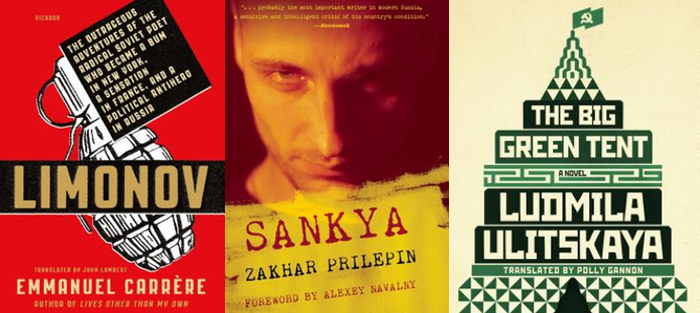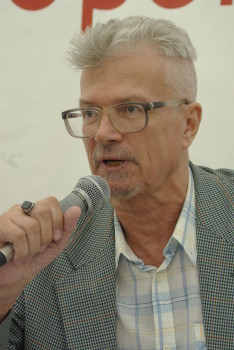Editor’s Note: An earlier version of this essay was published without the accompanying footnotes, which the author has since added to clarify and expand upon several points raised in conversation with fellow translators and members of the literary community.
A ubiquitous metaphor of the translator is the asymptote, the curve which approaches infinity at the same time it approaches zero. It never quite makes it. This is apt, considering that translators must match, as closely as possible, not only parts of speech but also idiom, something which requires knowledge of both languages’ cultures. The more distant those cultures in common values, such as politics, the more difficult the translator’s task, even before focusing on more individual aspects of a given work.
In Russian literature, this problem has haunted translation at least since the beginning of the Soviet era. During the Cold War, the values of official Soviet culture (atheism, Communism) were often diametrically juxtaposed with those of American culture. This meant that what might be censored in the Soviet Union would not only be permitted but celebrated in the United States (and this phenomenon was likely often reversed in the Soviet Union).
This is one reason why it’s not difficult to find a work of Russian literature with gaps between its original and a later edition. This doesn’t only occur with translation. Even in a contemporary Russian-language edition of the 1928 novel The Twelve Chairs, by Soviet writers Ilya Ilf and Evgeny Petrov (Moscow, Act Izdatelstvo, 2008), there are expansive exclusions from the original manuscript. True, some of these exclusions may have been ultimately for the benefit of a more concise novel. However, some depictions—such as sycophantic Soviet citizens and corrupt institutions within the Soviet Union1—might have been potentially embarrassing to Soviet society. All of this raises the question of whether these exclusions were the results of artistic editing or political censorship, perhaps even self-censorship.
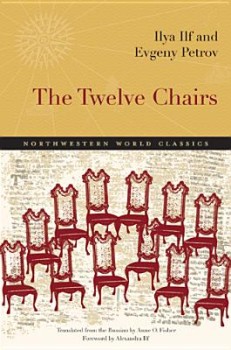 But often such gaps appear only when they are filled in for an English translation. In the case of The Twelve Chairs, the missing pieces came to light in the 2011 English translation of the novel by Anne O. Fisher (Northwestern University Press). In this translation’s foreword, Alexandra Ilf, the co-author’s daughter, explains that these erstwhile exclusions are now “offered to the American reader,” even before a reader of the original Russian can see them (at least in that 2008 Russian-language edition).2
But often such gaps appear only when they are filled in for an English translation. In the case of The Twelve Chairs, the missing pieces came to light in the 2011 English translation of the novel by Anne O. Fisher (Northwestern University Press). In this translation’s foreword, Alexandra Ilf, the co-author’s daughter, explains that these erstwhile exclusions are now “offered to the American reader,” even before a reader of the original Russian can see them (at least in that 2008 Russian-language edition).2
An even more demonstrative example of an intersection of politics and translation comes from an even more politically controversial work of Russian literature, Doctor Zhivago, the historical novel about the Russian Revolution,by Boris Pasternak. Documents declassified in 2014 reveal that, in 1958, the CIA secretly arranged Western publication of the Russian original of Pasternak’s novel. They also arranged for the novel’s translation into various foreign languages. One reason for this was so that the work, critical of the Soviet regime, could become available to the committee responsible for awarding the Nobel Prize in Literature. The CIA’s secret publication, translation, and distribution of Doctor Zhivago worked. Later that same year, Pasternak won the Prize, a huge victory for the West in the Cold War.
This took place during a time when Slavic departments in American universities flourished financially. And much of this money no doubt funded translation projects. Then, when the Soviet Union fell in 1991, the money pouring into Slavic departments dried up overnight. This funding and subsequent defunding suggests, of course, that there might be a political agenda to translation, at least from Russian into English.
But whose is that agenda? Twelve years after Pasternak won, Aleksandr Solzhenitsyn took the Nobel Prize, most likely due to his work’s criticism of Soviet totalitarianism, which led to his exile from the Soviet Union in 1974. He emigrated to the United States, where, in 1978, at Harvard University, he gave a speech in rising and falling Russian, alongside which a translator read in English over a speaker just as loud as Solzhenitsyn’s. Solzhenitsyn’s impassioned Russian, overdubbed by the translator’s ironic monotone, criticizes the secularism and vulgarity of American society. Despite the Cold War polemic that had brought him to the United States, Solzhenitsyn’s anti-Soviet rhetoric did not necessarily imply a pro-Western position.
After Solzhenitsyn’s return to Russia in 1994, he criticized Boris Yeltsin’s leadership, even though Communism had officially ended. He later praised Vladimir Putin’s. The aged writer’s dissidence translated into a nationalistic pride for Russia, which he believed Putin had achieved.
This was not equivocation. It had to do with how Solzhenitsyn distinguished Soviet culture from Russian culture. The super-state of the Soviet Union was made up of a variety of nationalities and people, and Soviet dissidents replaced allegiance to that state with a variety of ideologies. Legalism, Communism too rigid for the Party, Christianity, Zionism, and other ethnic identities and nationalisms became dissidents’ causes célèbres. The Soviet Union fell, but these political causes remained, and some still have bearing on the political events of today, such as the conflict in Eastern Ukraine.
Perhaps due to that conflict, as well as to Russian actions in Syria, attention to Slavic departments in universities has risen again. But who are today’s Pasternaks and Solzhenitsyns? The latter would probably be against any attempt to use his work—as the CIA used Doctor Zhivago—to undermine the current regime in power in Russia, which Solzhenitsyn supported. But Western readers—at least those who are sympathetic to dissidents in the post-Soviet East—may not draw the distinction Solzhenitsyn did between Soviet and Russian culture so readily.
One such reader is the French filmmaker and writer Emmanuel Carrère. In the introduction to Limonov (Farrar, Straus and Giroux, 2014, translated by John Lambert), his biography of the Russian writer-politician Eduard Limonov, Carrère writes about his subject’s nostalgic rage when the Soviet Union fell: “Things began taking a turn for the bizarre with the collapse of communism. Everyone was delighted but [Limonov], and he didn’t seem to be kidding around anymore when he said Gorbachev should face a firing squad.” Limonov, like Solzhenitsyn, left the Soviet Union in 1974 and, also like Solzhenitsyn, returned twenty years later. He even spent part of his time in America. The difference between these “dissidents”—the quotation marks are for Limonov—is that Limonov’s was a self-imposed exile, and his nationalism took on an entirely different form than Solzhenitsyn’s retreat into tradition. It’s this “bizarre,” greater paradox that Carrère sets out to understand in Limonov.
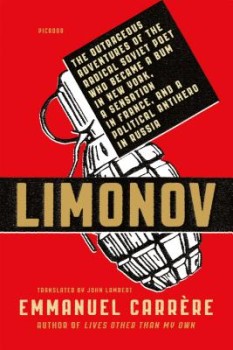 Carrère’s subject may, at first glance, simply appear as a more extreme version of Solzhenitsyn. After the Soviet Union ended, Limonov, as if connected by a kind of Slavic/Orthodox Christian solidarity, joined Serb fighters in the Yugoslav Wars. The Yugoslav Wars were in a sense leftover effects of the Cold War polemic between the West and Soviet East. However, the word “Balkanization”—its root, of course, from the Balkan peninsula, where the Wars took place—illustrates the messier complexity of this conflict. In Limonov, Carrère writes about unconventional Westerners who took the side opposite that of most Westerners in this conflict, with Western governments supporting the Catholic Croats and Muslim Bosniaks versus some post-Soviet states—such as Russia (Limonov’s side)—supporting the Orthodox Christian Serbs.3 Those unconventional Westerners, some of them French (that is, ethnically Catholic) and acquainted with Limonov, took the Orthodox Christian side here, more against Bosnian Muslims than for fellow Catholics (the Croats). In the Yugoslav Wars, Balkanization resulted in more than two sides, and the Cold War polemic became more complicated and multidimensional.
Carrère’s subject may, at first glance, simply appear as a more extreme version of Solzhenitsyn. After the Soviet Union ended, Limonov, as if connected by a kind of Slavic/Orthodox Christian solidarity, joined Serb fighters in the Yugoslav Wars. The Yugoslav Wars were in a sense leftover effects of the Cold War polemic between the West and Soviet East. However, the word “Balkanization”—its root, of course, from the Balkan peninsula, where the Wars took place—illustrates the messier complexity of this conflict. In Limonov, Carrère writes about unconventional Westerners who took the side opposite that of most Westerners in this conflict, with Western governments supporting the Catholic Croats and Muslim Bosniaks versus some post-Soviet states—such as Russia (Limonov’s side)—supporting the Orthodox Christian Serbs.3 Those unconventional Westerners, some of them French (that is, ethnically Catholic) and acquainted with Limonov, took the Orthodox Christian side here, more against Bosnian Muslims than for fellow Catholics (the Croats). In the Yugoslav Wars, Balkanization resulted in more than two sides, and the Cold War polemic became more complicated and multidimensional.
It’s at this point in Limonov where Carrère takes a risk and states that, since one must choose a side, the only universal principle is for one to choose the side that’s weaker—in this case, to call the Bosnians victims of the Serb aggressors, with whom Limonov’s allegiance lay. In his discussion of the Yugoslav Wars, Carrère states that when he later watched documentary video footage of Limonov alongside Serb fighters firing a gun over a besieged Sarajevo, he gave up on writing Limonov for over a year. Limonov’s act in Sarajevo went far beyond a call for Gorbachev to be shot. While Carrère writes that Limonov didn’t fire at anybody in particular, he could very easily have injured or even killed somebody.
This is the most insightful and important part of Limonov, since it hints that the author felt as if his description of Limonov’s life somehow made him complicit in Limonov’s moral violations. It’s here Carrère delves deepest into the problems he encounters with this biography. And because Carrère’s own conflict is so complex at this moment, this section of Limonov best examines the paradox of its subject.
But Carrère stops short. The book was published, so we know he began his project again. However, his initial reluctance to choose a side seems to have become a desire to bridge the two sides. Conflicted about whether or not to tell Limonov’s story, perhaps Carrère decided once again to choose the weaker side and to continue writing Limonov. It’s very likely nobody else would. This is what makes Limonov so important to the conversation about politics and translation: Carrère has attempted to “carry over”—translate—a Russian cultural and historical figure, Limonov, with his world-weary Russian politics and nationalism, to a Western audience, one which has a historical understanding of the political events in which Limonov took part that is very foreign to Limonov’s own.
Perhaps one can even view Limonov as an attempt at translating historiography. More than once, in parts of Limonov that precede the narrative about the Yugoslav Wars, Carrère anticipates a negative reaction on the part of his Western reader and makes attempts at arguing on Limonov’s behalf. After quoting His Butler’s Story, a memoir in which Limonov writes of refusing to feel sorry for a boy dying of cancer, Carrère comments:
What an asshole! Steven [Gray, a rich New Yorker for whom Limonov served, the subject of His Butler’s Story] thinks, and I think the same thing, and no doubt you do too, reader. But I also think that if anything could have been done to save the little boy, especially if that something was hard or dangerous, Eduard would have been the first to attempt it, and he would have given it everything he had.
But that’s not what happened and not what Limonov wrote. This defense, then, seems revealing. Is Carrère worried that the reader may give up on Limonov here or, even more likely, later, when he or she sees Limonov as a war criminal? Or does Carrère want to challenge the reader’s own moral alignment, in the same way his was challenged while writing Limonov?
The book’s negative capability—which Carrère himself must have employed in order to continue writing it, and which he must have understood the reader would need too—may explain why Limonov is referred to in marketing as a “fictional biography” or “pseudobiography” and labeled as fiction in the U.S., as well as in the U.K. and France. It’s as if the publishers of the original and its translation want to disclaim historicity. For one thing, this hybrid genre is in keeping with Limonov’s literary work. The subject of Limonov has himself written several memoirs, which he refers to as “autobiographical novels.” The term suggests exciting “stranger-than-fiction” accounts of Limonov’s rags-to-riches-to-rags writer’s life.
But Limonov is a politician too and used his memoirs, like any politician, to mythologize his personality. In 1994, he cofounded the National Bolshevik Party of Russia. Limonov bolstered his political career by helping to translate his own background into a cult of personality. But the memoirs probably also turned off some of Limonov’s nationalist compatriots. During the first stage of his self-imposed exile, when he spent 1975 – 1980 in New York City, Limonov was involved in love affairs with men. Again, similar to the issue with Solzhenitsyn’s position on Yeltsin, a Western reader may ask why shouldn’t the emigrant to New York, like so many other Russian emigrants, have been happy when the Soviet Union ended? Why is this bisexual punk toeing the nationalist line?
One characteristic that sets Limonov apart from Solzhenitsyn is his hypersexuality and homosexuality, both explicitly described in Limonov, sometimes to a fault, as if Carrère is making apology for Limonov’s objectification of his sexual partners of both sexes. The first man with whom Limonov had sex in New York was black and homeless, which Carrère highlights (perhaps as Limonov did in this particular scene of his memoirs), as if to show the tolerant and kinder side of his subject. Later in Limonov, Carrère qualifies an affair with an underage girl: “I know how violently our era condemns an older man’s fondness for young flesh. But what can you do, that’s how it is.” Carrère leaves it at that.
This comes near the end of the book, and at this point it feels as if Carrère may have suspended judgment for too long. He has come full circle from his introduction, in which he listed admirers of Limonov, a list which gives pause to the Western reader savvy about dissidents. The assassinated investigative journalist Anna Politkovskaya defended the Natsbols (the dubious nickname of the National Bolsheviks) after they pulled some pranks in the presidential office. Even Yelena Bonner, the widow of the famous dissident Andrei Sakharov, has sung praises of Limonov’s party, according to Carrère.
By mentioning these admirers, Carrère is translating politics that make sense to Politkovskaya and Bonner, dissident heroines in the West. It’s as if he’s using their endorsements of Limonov as justification for his conclusion (or lack thereof) about the mystique of Limonov. Carrère seems to want to understand the way Politkovskaya and Bonner do, rather than simply dismissing Limonov, as so many Westerners might, because of his nationalism. Yet Carrère can’t escape being a Westerner, the context it forces on even the most unconventional of us. It’s this that caused the apprehensions, which make the pages of Limonov devoted to the Yugoslav Wars and Carrère’s struggles with his subject the most human and honest.
At the end, Carrère seems determined to take the middle road, as the quotation at the beginning of Limonov implies:
“Whoever wants the Soviet Union back has no brain. Whoever doesn’t miss it has no heart.”
However, this quote is from Putin, who is a bit more difficult to admire than Limonov, even for somebody withholding judgment for as many pages as Carrère often does. At the end of the book, Carrère has painted Limonov as a sort of would-be Putin instead of further comparing him to Solzhenitsyn. With his attempt to understand and perhaps apologize for Limonov, Carrère runs the risk of doing the same for Putin himself, as Solzhenitsyn may have done.
And, like Putin, it’s very clear on which side Limonov locates himself. Carrère admits his subject would likely have little more than disdain for the Western audience of Limonov. Russian-language readers of Limonov’s memoirs may not view the paradox of Limonov as paradox. But one hopes that, just as he identifies the paradox of Solzhenitsyn’s lionized condemnation of the Soviet Union and subsequent praise for Putin, a reader of Limonov will identify a similar paradox and yet be able to avoid moral relativism. This “translation” may speak more about its Western author and even its Western audience than about the audience of the original Limonov memoirs it digests.
Another writer and Natsbol mentioned in Limonov, and about whom Carrère is never ambiguous with his admiration, is Zakhar Prilepin. His novel Sankya, translated into English by Mariya Gusev, Jeff Parker, and Alina Ryabovolova (Dzanc Books, 2014), would appear to answer the earlier question of who today’s Pasternaks, Solzhenitsyns, and even Limonovs are. Based on Carrère’s praise, Prilepin would seem to be the dissident heir, as represented loosely by his protagonist Sankya.
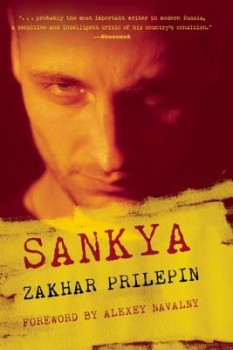 This novel throws the difference between the two audiences of a work’s original and its translation into even greater relief. In Russia, Zakhar Prilepin is very popular, especially since Sankya, originally a play titled “Thugs,” debuted in 2006. The novel’s protagonist, Sankya, is a member of an anti-government, prank-provocateur party, translated as “The Founding Fathers.”4 The Founding Fathers have unmistakable similarities to the National Bolsheviks. Young Russian readers might especially appreciate the scene when Sankya must transport his father’s coffin from his rural home village even further into the sticks. Their hired driver ejects Sankya, his mother, and his father’s only friend. They end up on foot, having to push the coffin across the frozen ground. Like a wintry, Russian As I Lay Dying, this chapter is the novel’s best metaphor for the condition of the Russian people of Sankya’s generation, forced to carry the trauma of their Soviet forebears, who experienced such a sudden and drastic change from their former way of life.
This novel throws the difference between the two audiences of a work’s original and its translation into even greater relief. In Russia, Zakhar Prilepin is very popular, especially since Sankya, originally a play titled “Thugs,” debuted in 2006. The novel’s protagonist, Sankya, is a member of an anti-government, prank-provocateur party, translated as “The Founding Fathers.”4 The Founding Fathers have unmistakable similarities to the National Bolsheviks. Young Russian readers might especially appreciate the scene when Sankya must transport his father’s coffin from his rural home village even further into the sticks. Their hired driver ejects Sankya, his mother, and his father’s only friend. They end up on foot, having to push the coffin across the frozen ground. Like a wintry, Russian As I Lay Dying, this chapter is the novel’s best metaphor for the condition of the Russian people of Sankya’s generation, forced to carry the trauma of their Soviet forebears, who experienced such a sudden and drastic change from their former way of life.
The friend of Sankya’s father is Bezletov. In Russian, his name could be interpreted to mean “without years,” or inexperienced, green. In a different scene, Bezletov argues with the young radical, Sankya, and fails to convince him to soften his approach to political change. Such failure, a reader suspects, has to do with Bezletov’s lack of direct action. Discussion, argument, and nuance represent weakness. To Sankya, talk is cheap. In the novel of his name, introspection represents an inability to tell it like it is, be frank and explicit. Suppression of emotion is one of his greatest skills. And it works. When arrested later on, Sankya’s tough enough to resist during an interrogation by two agents of the FSB (the acronym for the state security agency, the modern KGB). He’s still just a kid, and Prilepin allows us to see him psyching himself up after one interrogator has just threated to torture him. Sankya asks to use the bathroom, and, amazingly, they let him go. There he clears any human fears or doubts from his mind.
When he comes out, the interrogators assault him, and he ends up in a hospital with another character who talks too much, Lev. Sankya immediately recognizes Lev as a Jew. Like Bezletov, Lev argues but doesn’t violently confront anybody. To Sankya, he has old-fashioned political views, one of those being a fear of latent anti-Semitism in the country he calls home. To which Sankya replies that, with few exceptions, Russian anti-Semites are all Russian Jews themselves. This doesn’t offend, or even surprise, Lev, however. He knows the culture of Russia like it’s his own. He asks what if “the whole country is composed of crazies and losers?”5 Sankya evades the question, then he replies, as follows:
“The problem is something quite different,” Sasha [Sankya] said, determined to finish the thought he started. “What we’re speaking about is completely superficial, even forced”—here Sasha almost said forced by you—“and we should just forget about it.”
That italicized “you” is stark. It could refer to Lev personally, as Sankya did earlier. Only on earlier occasions, Sankya used the Russian informal you, ti. In the Russian original, this “you” is the Russian formal and/or plural vi. Since, based on that earlier ti, it’s hard to imagine that Sankya is now being formal with Lev, this “you” must refer to many people, a whole group, such as, in keeping with the conversation’s theme, the Jews.
According to Sankya, Jews make up the remainder of Russia’s anti-Semites. And they’re the ones who have “forced” the conversation. In this sense, anti-Semitism is merely an invention of Jews themselves, allegedly in order to gain sympathy or give criticism where it isn’t due. This thought and the one preceding it characterize Sankya as a full-fledged anti-Semite. That he bites his tongue only further confirms this characterization: even he can’t say such a thing in front of Lev, a Jew.
If Sankya had said this plural “you,” Lev, knowing his fellow Russians so well, might have shrugged it off all the same, as a Russian reader may also have done.6 However, it’s important to mention here that, similar to Limonov, the English translation of Sankya includes an endorsement of Prilepin in the form of a short foreword by the famous Russian dissident lawyer, Alexei Navalny. This foreword by a political figure, not a writer or critic, suggests a certain kind of political posture for the book. Is it convenient to the translator’s rendering of the story, then, to obscure the protagonist’s anti-Semitism? Or at least not translate it to be as explicit as it is in the Russian original? Maybe, like Carrère, the translators of Sankya have chosen to momentarily withhold judgment. Or maybe this is nitpicking, and a reader won’t see Sankya’s anti-Semitism as significant. However, a reader interested in Russian dissidents—particularly one who is embarrassed by Solzhenitsyn’s puritanism and disappointed by Limonov’s nationalism—may feel offended by what appears to be unchecked anti-Semitism, a political third rail in American culture. He might feel guilty sympathizing with this protagonist, if he continues reading.
Whether because of whitewashing or oversight, a reader of this translation simply can’t take away a clear picture of this anti-Semitic character as a progressive dissident. If the purpose of reading a translation is to know the culture from which the original comes, shouldn’t we comprehend it in its entirety, warts-and-all, so to speak? Shouldn’t we let post-Soviet people and their politics speak for themselves? Perhaps, like with Limonov, the English translation of Sankya says more about its American, or English-speaking, audience than the original’s Russian one. Perhaps the problem comes from the Western audience’s need for heroes, who, like fictional characters, don’t exist. Navalny’s political endorsement also comes off as a stamp of authenticity. But the only way the translation can be authentic is if it carries over all of Sankya’s characteristics. It might even do some apologetic work on his behalf, showing that, like an antihero, he has faults, which make him more human—that is, more universal. It may better show how his society has misshaped Sankya. However, the way the translation is now, intentional or not, calls into question the self-righteousness of Western society. How far would political endorsement of his dissidence go while ignoring Sankya’s bad characteristics? And doesn’t that ignorance diminish the self-righteousness of whoever might endorse him?
The figure of the dissident, in all their human failings, is the subject of another recently translated book, The Big Green Tent, by Ludmila Ulitskaya (Farrar, Straus and Giroux, 2015). This translation doesn’t appear to be as politicized as Sankya. This might simply be because its characters are of the bygone Soviet era. But The Big Green Tent depicts real people alongside fictional characters. At one point, a poem written by Limonov appears on the page, while co-editors of a samizdat literary journal discuss what poetry to publish. They don’t name the writer, who at that time (’67 – ’74) had not yet become a politician. It’s likely, though, that some readers may guess who the poet is, when the characters simply refer to him as “a young fellow from Kharkov.”
Just as with Limonov’s memoirs (and, a reader may assume, Prilepin’s novel), using real historical figures—or a story very tightly based on reality—suggests that the writer herself has at least something of a political agenda. But Ulitskaya’s agenda appears to be more multi-faceted than Prilepin’s. The Big Green Tent enters and exits many lives, both connected and unrelated to one another. Montage is abundant. Instead of plot sequence, characterization often moves the tale along. This is essential to Ulitskaya’s oratory style, as if an old survivor of the Soviet Union is holding court at a communal kitchen table, set with hot tea, for nearly 600 pages. The narrative voice weaves in and out of many characters’ inner voices.
This polyphony stands in stark contrast to the monolithic perspective of Sankya. It complicates the nationalistic generalization that all citizens of a country, dissidents or not, think and act in the same way. And this goes for forms of Soviet political dissidence as well.
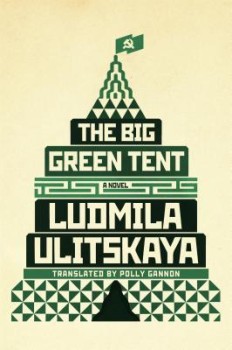 For this reason, Polly Gannon, the translator of the English-language version of The Big Green Tent, must have had to vary her approach to the translation of this novel, with its diversified tone. This tone presents much more potential for obfuscation, such as with the translation of Sankya. Ulitskaya hopes to depict a diversity of perspectives, and the translation must reflect the political meaning of her work. Gannon chooses how far she changes the text in her translation. She must alter the rhythm and meter of Ulitskaya’s poet-character, Mikha, in order to translate the novel’s comparison of the fictional Mikha’s poetry to that of the real poet, Joseph Brodsky. According to the narrator, Brodsky later overturned the rigid rhythm of Russian poetic convention.
For this reason, Polly Gannon, the translator of the English-language version of The Big Green Tent, must have had to vary her approach to the translation of this novel, with its diversified tone. This tone presents much more potential for obfuscation, such as with the translation of Sankya. Ulitskaya hopes to depict a diversity of perspectives, and the translation must reflect the political meaning of her work. Gannon chooses how far she changes the text in her translation. She must alter the rhythm and meter of Ulitskaya’s poet-character, Mikha, in order to translate the novel’s comparison of the fictional Mikha’s poetry to that of the real poet, Joseph Brodsky. According to the narrator, Brodsky later overturned the rigid rhythm of Russian poetic convention.
However, when it comes to a more political depiction, Gannon leaves the epithet “Algerian” for a woman who spent time in the “Akmolinsky Camp for Wives of Traitors to the Homeland.” The acronym in English translation doesn’t match up with the name of the camp. A reader may be left wondering where the epithet comes from. In Russian, the camp is called Akmolinskii Lager dlia ZHyon Izmennikov Rodiny. Here is where the Russian acronym’s A, L, ZH (one letter in Cyrillic), I, and R come from. These letters, followed by a feminine suffix, make the word alzhirovka, the Russian word for an Algerian woman. If Gannon had tried to make the epithet out of the English translation of the name of the camp, ACWTH, the effect would be lost. It would be cut off from history. Algerians until the 1960s were a colonized people, historical losers in the game of world politics. This was likely the implication (perhaps relayed through gallows humor) of the epithet “Algerian” for these Soviet women, guilty of nothing but marriage to “traitors.” To lose this history in translation means to lose its political meaning, one which certainly has an effect on a reader’s opinion of these characters’ plights.
In this way, too, The Big Green Tent differs from Sankya. Prilepin’s Founding Fathers brawl with Central Asian immigrants, while the dissidents in Ulitskaya’s novel publish samizdat articles discussing the persecutions of the Tatars deported from Crimea by the Soviet government after World War II. These dissident characters, despite their own troubles, have solidarity with those oppressed in contexts beyond their own. The various forms of dissidence listed earlier in this essay came from a sentence in The Big Green Tent. Despite the novel’s specificity and detail, there is a universal theme of resistance against hegemonic institutions. When a character named Olga is summoned to Lubyanka, the notorious headquarters of the KGB, for an interrogation, she ponders the headquarters of the FBI.
“I ask the questions here; you answer. You seem to consider yourself to be very smart and perceptive, Olga Afanasievna.” He smiled, showing his large teeth, and for a moment Olga was overcome by something like horror. Suddenly she felt naked, vulnerable to a bite or a needle, as soft as a mollusk without its shell. At the same moment, she realized she needed to recover her composure, and she asked to go to the toilet.
Alexandrov made a phone call, and a heavy woman with a large rump came in, then led her down a corridor with unpredictable twists and turns to a WC. There were squares of newsprint hanging from a nail in the wall. Squatting over the toilet, which was clean but had no seat, she began thinking: I wonder what the bathrooms in the FBI look like? Then she laughed out loud, startling her chaperone.
This scene may defamiliarize a Western reader with the common idea of a KGB interrogation. Although there is menace here, Olga’s innocence is represented not by her defiance but by her wandering mind. The interrogator has large teeth, but the chaperone has a large “rump” (literally an adjective, “fat-bottomed,” in Russian). Olga even manages to laugh. The KGB is, of course, using Olga to approach Ilya, whose interrogation is a totally different, less whimsical situation. The “banality of evil” Westerners might associate with the KGB and perhaps with one of its former agents, Putin, has another purpose. Pointing out the ideological problems of the KGB to a contemporary reader would be quaint, anachronistic. The greater ideological conflict here is subtly embedded in the psychology of the scene and seems beyond both Alexandrov and Olga. It’s part of a greater depiction. A small change in the translation here could have a drastic effect on the political meaning of this scene, not to mention, of course, other elements of the scene’s meaning. For example, a translator with an agenda might have shifted the tone to accommodate a more sinister portrayal of the KGB while resenting or even obscuring the comparison with the FBI.
Subtlety is the key to how Ulitskaya shapes her characters, all too human in their failings. The Big Green Tent depicts how subtly ideologies, such as nationalism, work on human beings, even heroes. As Brodsky put it, “Such is the structure of life that what we regard as Evil is capable of a fairly ubiquitous presence if only because it tends to appear in the guise of good.” Although Brodsky probably meant this as a polemical statement, it has another meaning with regard to how delicate the distinction between evil and good is. Brodsky said this in English—so, for a Western, mostly American, audience. Could the takeaway perhaps be that the only way to handle politics in literature is to try to give as equivalent a rendering as possible? But delineating a foreign political agenda may expose the homegrown one of the translation, as well.
It would be interesting to read the translation of his quote in Brodsky’s native Russian. Whoever would do that translation would also play an irreducible role in the politics of this speech. This is even truer with a work of literary art. The translator must serve as a critic of the original, in a sense. However, this critical perspective should not change a text unnecessarily but instead render it more comprehensively, with all of a text’s paradox and irony. Is this true even if the original author himself didn’t catch that irony? Another opportunity for critical reception is heard in Solzhenitsyn’s 1978 speech, when his explanation of how human weakness allows horrors to take place comes right before his chastisement of the United States for ending the Vietnam War too soon, all in monotonous English translation.
Today, the Vietnam War is widely viewed as a historical mistake. But, in 1978, Solzhenitsyn’s positive opinion about it was more mainstream. Similarly, in The Big Green Tent, the dissidents’ copies of The Gulag Archipelago are samizdat. Today, the FSB interrogators in Sankya would not only be permitted and easily able to read The Gulag Archipelago, but they might also find some kinship with Solzhenitsyn’s support for the contemporary Russian state. The Information Age has made samizdat redundant, since most Russian literature is available on the Internet (so long as it isn’t censored). Does this make contemporary dissidents, such as Sankya, any less complex, because they have a poorer excuse for not reading up on history?
Such a situation requires the scrutiny of a translator, whose work (similar to that of a political analyst) is necessary because of her rare ability to understand both languages, both cultures. But this understanding should also include an ability to translate the politics of the original into something understandable—even if not necessarily palatable—to the audience of the translation. Aren’t we American readers responsible enough to distinguish between good and bad politics?
What is the purpose of one culture translating another? One reason Slavic departments thrive during political crises would seem to be so that we can better understand the cultures of the post-Soviet East. Another reason, though, may be something more akin to the motives of the CIA in translating Doctor Zhivago.
Even if understanding is the primary reason, we, as a culture, are failing to make the effort. As a former Permanent Secretary to the Swedish Academy pointed out, we are reading mostly ourselves instead of translations of Russian writers anyways. Shouldn’t we let post-Soviet people and their politics speak for themselves? Is the difference between the political meanings and translations of Limonov, Sankya, and The Big Green Tent even worth pointing out, if few will read them? Maybe we’ll never understand the politics and people of the post-Soviet world, in our news feed so often these days, because we’re not reading the literature of the post-Soviet world itself.
Again, one comes to another asymptote, this one with regard to the readership of translation. What if the 3% of books published in our country that are translations slips to 2%, then 1%, and finally reaches zero? What will this mean in terms of our own politics? Likely, nothing good.
1. Such depictions also appear in the Russian edition, which makes it difficult to determine what the rationale was for these exclusions.↩
2. After publication of this essay, Anne O. Fisher contacted me to explain that her translation is based on a comprehensive Russian edition published in 2001 by Moscowbased Tekst. She suspects the 2008 edition by Act is based on the 1962 edition of The Twelve Chairs, which she identifies as the version with the most exclusions.↩
3. This breakdown is a regrettable reduction merely for the purpose of this essay, and I acknowledge there were many other peoples involved in the conflict but excluded from this explanation. ↩
4. In response to claims that Sankya is not antiSemitic, it is important to point out that, in the original, the “Founding Fathers” are the Soyuz Sozidayushchikh. Although the translators found a good equivalent to the alliteration of the Russian name of the group, FF does not have the same connotation as SS, especially in a European context.↩
5. At this point Sankya responds to Lev’s question by saying that among Jews, there are fewer “losers” but more “crazies,” as if to say Jews, as a group, were more successful than they should be, proportionally, and that they have more radical ideas. Historically, both these claims often come from anti-Semites.↩
6. Sankya does use vi once before using ti several times. In the Russian, the vi comes “unexpectedly” (neozhidanno), at a point where Sankya appears to have become impatient with Lev. In the English translation, there is no rendering of the Russian Sasha unexpectedly switched to “vi”. Why did Prilepin write this? What nuance of the conversation was he pointing out by having Sankya make that switch, which he later almost speaks?↩

